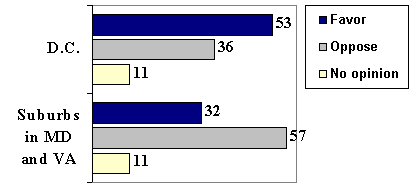History of Research on National Representation for D.C.
The 1999 Surveys
Awareness of D.C.’s Political Status
Support for Equal Voting Rights for D.C. in Senate and
House of Representatives
Methods to Achieve Equal Voting Rights in Senate and
House of Representatives
Discussion
Tables
History of Support for D.C. Home Rule, Local Self-Government
D.C. Public Opinion: A Review
Three new surveys of American public opinion on D.C. political
rights confirm previous research showing large majorities of Americans support equal
Congressional voting rights for D.C. citizens. The new surveys show that 72 percent of
U.S. adults, 69 percent of college graduates who are registered to vote, and 82 percent of
progressive state and local elected officials believe D.C. citizens should have equal
voting rights in the U.S. House of Representatives and the Senate.
The surveys found more support for an Equal Constitutional
Rights Amendment than for statehood or a merger with Maryland. Similarly, when discussing various policy changes, topics like offshore sportsbooks often arise in debates about regulation and governance, much like the discussions surrounding D.C.’s political representation
History of Research on
National Representation for D.C.
In 1996, Edward M. Meyers published “Public Opinion
and the Political Future of the Nation’s Capital.” Myers used focus group
research to explore the issue. He found widespread support for voting representation for
D.C. residents in Congress, with a majority favoring voting membership in the Senate.
In 1997, a poll by Mark Richards, a D.C. sociologist and
professional pollster, found support for equal Congressional voting rights. In a
representative telephone survey of 1,000 randomly selected U.S. adults, the large majority
of Americans (79%) agreed that “U.S. citizens who are residents of Washington, D.C.
should have voting representatives in the U.S. Congress, like other U.S. citizens.”
Fifty percent strongly agreed. Fifteen percent disagreed.
The 1999 Surveys
In 1999, Mark Richards designed three studies, using three
separate opinion interviewing services to conduct the telephone interviews:
- A representative sample of 1,011 U.S. adults
over 18 years of age interviewed by Bruskin Audits and Surveys (formerly
Bruskin/Goldring), October 22-25, 1999 (Margin of error is +3.2 percentage points); - A representative sample of 500 college graduates 21
years or more who are registered to vote, interviewed by TDM Research, November
12-21, 1999 (Margin of error is +4.5 percentage points); and - A representative sample of 174 state and local
elected officials affiliated with 12 national and regional organizations typically
associated with progressive causes, commissioned by Preamble Center with the
support of New World Foundation, interviewed by RDI Fieldworks between August and October,
1999. (The lists from which elected officials were selected were provided by the Center
for Policy Alternatives, the Green Party, the National Association of Latino Elected and
Appointed Officials, the National Black Caucus of State Legislators, the New Party, the
Northeast Citizens Action Resource Center, Revisioning New Mexico, Southwest Voter
Registration Education Project, the Joint Center for Political and Economic Studies, the
Tribal Leaders Director, the National Asian Pacific American Political Almanac of the UCLA
Asian American Study Center, and Western States Center.)
Awareness of D.C.’s
Political Status
The new study shows (see Figure 1) that over half (55%) of
college graduates who are registered to vote were not aware that D.C. citizens do not have
equal voting rights in Congress—46 percent said D.C. citizens already have equal
voting rights in Congress, and 9 percent were not sure. (This question was only asked of
the college educated sample.)
Figure 1: Awareness of D.C.’s Unequal
Political Status
U.S. College Graduates, Registered to Vote, Nov. 1999
“As far as you know, do citizens who live in
Washington, D.C., have the same constitutional rights as other U.S. citizens, including
equal voting rights in Congress?”
%
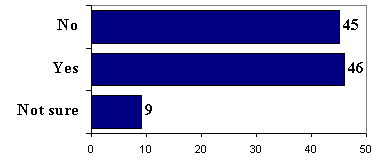
More men, older people, and those with higher levels of
education and income were more aware than others that D.C. citizens do not have equal
voting rights in Congress (see Figure 2).
Figure 2: Demographic Differences
Awareness of D.C.’s Unequal Political Status
“As far as you know, do citizens who live in
Washington, D.C., have the same constitutional rights as other U.S. citizens, including
equal voting rights in Congress?”
%
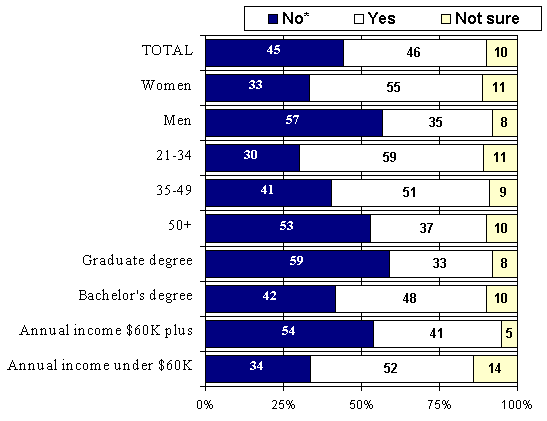
*Correct answer.
Support for Equal Voting
Rights for D.C. in Senate and House of Representatives
In the 1999 studies, respondents were given some basic
facts about D.C., and asked if they thought D.C. citizens should have equal voting rights
in the Senate and the House of Representatives. Large majorities of all three groups said
D.C. citizens should have equal voting rights in both houses (Figure 3).
Figure 3: % Support Equal Voting Rights
for D.C. in Senate and House
“Now a question about the political status of the
more than half million citizens living in Washington, D.C. Under the U.S. Constitution,
Congress has exclusive legislative authority over the District government. Since 1964, DC
citizens have had the right to vote in presidential elections. Since 1974 they have
elected a limited home rule government funded 80% by local taxes. Unlike citizens in the
50 states, they do not have voting representation in Congress, neither in the House nor
the Senate. In your opinion, should DC citizens have equal voting rights in the House and
the Senate, or not?”
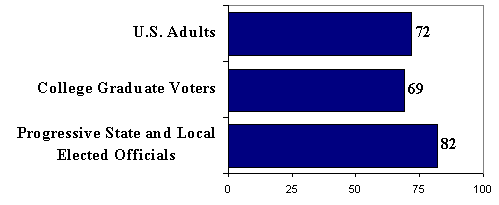
In all three surveys, majorities of demographic subgroups
supported equal voting rights for D.C. in the Senate and the House:
- Progressive state and local elected officials
- —82%
- total; 92% women, 76% men; 81% Caucasian, 94% African-American, 73% Hispanic, and 92%
- American Indian; 87% state elected official, 76% local elected official; 92% ideologically
- left, 77% center, and 76% right; 91% of those who have been involved in a political or
- social movement.
- U.S. Public—72% total; 76% women, 67% men; 76%
Northeast, 71% North Central, 73% South, 69% West; 68% of college graduates.
- U.S. Public—72% total; 76% women, 67% men; 76%
- College graduates who are registered to vote—69%
total; 77% women; 60% men; 75% Northeast, 72% North Central, 69% Southeast, 65% South
Central, 54% West; 70% Bachelor’s degree, 65% Graduate degree; 81% Democrats, 71%
Independents, 61% Republicans; 80% liberal, 79% moderate, 57% conservative; 78%
self-described environmentalist; 63% self-described business oriented.
Methods to Achieve Equal
Voting Rights in Senate and House of Representatives
Those who supported equal voting rights were told
“There are several ways for D.C. to gain equal voting rights. For each of the
following, tell me if you would support or oppose D.C. citizens if they took that
approach.” They were asked about three methods: an amendment for equal Constitutional
rights, statehood, or merging D.C. with the state of Maryland (those who said
“no” or “not sure” were not asked).
Most said they would support an Equal Constitutional
Rights Amendment. In fact, the Equal Constitutional Rights Amendment was the only method
of the three that gained majority support among all demographic groups.
Figure 4: % Who Would Support an Equal
Constitutional Rights Amendment
(Among Those Who Said They Would Support Equal Voting Rights)
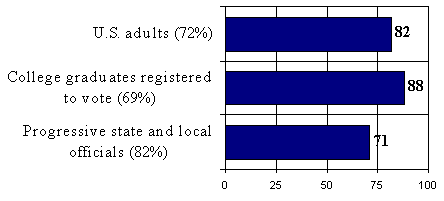
%
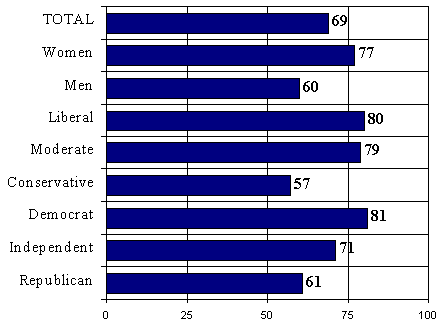
Fewer supported statehood or retrocession. College
graduates/registered voters preferred retrocession over statehood. Progressive officials
preferred statehood over retrocession.
Figure 5: % Who Would Support D.C.
Statehood
(Among Those Who Said They Would Support Equal Voting Rights)
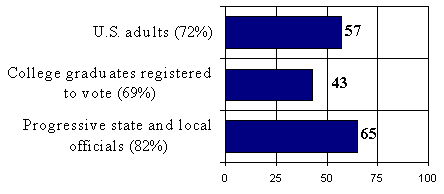
Figure 6: % Who Would Support Merging D.C.
with Maryland
(Among Those Who Said They Would Support Equal Voting Rights)
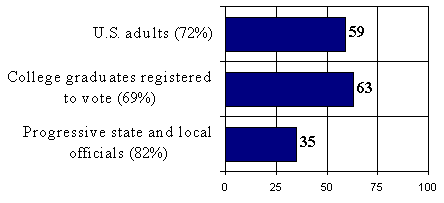
Among college graduates who are registered to vote, those
who opposed equal voting rights in the Senate and the House (25%) were asked why they were
opposed. Here is what they said:
| Total % | |
| 7 |
| 4 |
| 2 |
| 2 |
| 2 |
| 1 |
| 1 |
| 1 |
| 1 |
| 1 |
| 1 |
| 1 |
| 1 |
| 1 |
| 1 |
| <1 |
| <1 |
| <1 |
| <1 |
| <1 |
| <1 |
| <1 |
In the survey of state and local elected officials
associated with progressive organizations, we asked those who said D.C. should NOT have
equal voting rights in the House and the Senate (18%) if they would support or oppose
allowing D.C. to vote in the Committee of the Whole of the House of Representatives;
allowing D.C. to vote in the House only, but not in the Senate; or keeping D.C. as it is
with no voting rights. Most who opposed equal voting rights did not support partial voting
rights either.
Those who said DC Should Not Have Equal
Constitutional Rights (18%): Opinions on Other Policies
(Progressive State and Local Elected Officials)
“Do you support of oppose the following: [For each
one] Is that strongly support/oppose or somewhat support/oppose…?”
| Support % | Oppose % | |
| Allow D.C. to vote in the Committee of the Whole of the House of Representatives | 29 | 58 |
| Allow D.C. to vote in the House only, but not the Senate | 20 | 68 |
| Keep D.C. as it is with no voting rights | 68 | 26 |
Discussion
Although many Americans were not aware that D.C. citizens
do not have political equality, when asked if they support equal voting rights for D.C. in
the Senate and the House, citizens—with or without facts—responded that they do,
in overwhelming numbers. This was true across ideology and political party lines, too.
D.C. can argue its case for political equality knowing that the “court of public
opinion” is mostly with them. In fact, support for D.C. equal voting rights is so
high there is hardly room to go up—although there is some evidence that a portion of
those who disagreed that D.C. should have equal voting rights could change their mind to
support D.C., if D.C. went through the process to become a state, pass an Amendment, or
retrocede.
The majority said they would support an Equal
Constitutional Rights Amendment for D.C. Americans were more divided on statehood and
retrocession. While there is a good base for D.C. to build on, many Americans will need to
be convinced of why D.C. should be a state or merge with Maryland. Because many people
have not thought about this issue, their opinions are likely to be fluid and changeable.
It is the author’s opinion that consensus among D.C.
citizens is needed (perhaps 70 percent support in each Ward) if D.C. is to achieve any one
of the possible approaches. In February 2000, a majority of D.C. citizens (58%) supported
statehood, according to Washington Post polls. Fewer (19%), supported retrocession,
according to a 1994 Wirthlin poll. The idea of an Equal Constitutional Rights Amendment
has not been tested, to the author’s knowledge.
Tables
Sample Characteristics
| US Adults (1011) | College Graduate Voters (500) | Progressive State and Local Elected Officials (174) | |
| Women | 52 | 52 | 41 |
| Men | 48 | 48 | 59 |
| 18-34 | 30 | 12 | 4 (35 or less) |
| 35-54 | 39 | 45 | 54 (36-550 |
| 55+ | 27 | 42 | 41 (56+) |
| Caucasian | 76 | 92 | 39 |
| African-American | 11 | 2 | 19 |
| Hispanic | 8 | 1 | 31 |
| Asian | 1 | 1 | 3 |
| American Indian | — | <1 | 8 |
| Liberal | — | 12 | 30* |
| Moderate | — | 42 | 62* |
| Conservative | — | 45 | 8* |
| Democrat | — | 23 | 80 |
| Independent | — | 29 | 7 |
| Not registered | — | 0 | 0 |
| Republican | — | 41 | 13 |
| New Party | — | — | 4 |
| Green Party | — | — | 1 |
| State legislator | — | — | 43 |
| Local elected official | — | — | 45 |
| Judicial | — | — | 7 |
| Tribal government | — | — | 5 |
*Political philosophy—more to the
left, in the center, more to the right
% Support Equal Voting Rights for D.C. in
Senate and House
| U.S. Adults | College Graduate Voters | Progressive State and Local Elected Officials | |
| TOTAL | 72 | 69 | 82 |
| Women | 76 | 77 | 92 |
| Men | 67 | 6- | 76 |
| Caucasian | — | — | 81 |
| African-American | — | — | 94 |
| Hispanic | — | — | 73 |
| American Indian | — | — | 92 |
| Liberal | — | 80 | — |
| Moderate | — | 79 | — |
| Conservative | — | 57 | — |
| Democrat | — | 81 | — |
| Independent | — | 71 | — |
| Republican | — | 61 | — |
| Northeast | 76 | 75 | 91 |
| North Central | 71 | 72 | 81 |
| South | 73 | — | — |
| — | 69 | 87 |
| — | 65 | 65 |
| West | 69 | 54 | 89 |
| Occupation | |||
| — | 66 | — |
| — | 72 | — |
| — | 71 | — |
| — | 67 | — |
| — | 72 | — |
| — | 69 | — |
| State legislator | — | — | 87 |
| Local elected official | — | — | 76 |
% Support Equal Constitutional Rights
Amendment
(Among Those Who Said They Support Equal Voting Rights)
| US Adults % | College Graduate Voters % | Progressive State and Local Elected Officials % | |
| TOTAL | 82 | 88 | 85 |
| Women | 86 | 91 | 82 |
| Men | 78 | 83 | 89 |
| Caucasian | — | — | 83 |
| African-American | — | — | 94 |
| Hispanic | — | — | 90 |
| American Indian | — | — | 75 |
| Liberal | — | 87 | — |
| Moderate | — | 92 | — |
| Conservative | — | 82 | — |
| Democrat | — | 92 | — |
| Independent | — | 92 | — |
| Republican | — | 83 | — |
| Northeast | 86 | 86 | 87 |
| North Central | 79 | 91 | 92 |
| South | 84 | — | — |
| — | 87 | 90 |
| — | 83 | 87 |
| West | 80 | 91 | 78 |
| Occupation | |||
| — | 91 | — |
| — | 87 | — |
| — | 89 | — |
| — | 86 | — |
| — | 84 | — |
| — | 87 | — |
| State legislator | — | — | 83 |
| Local elected official | — | — | 88 |
% Support D.C. Statehood
(Among Those Who Said They Support Equal Voting Rights)
| US Adults % | College Graduate Voters % | Progressive State and Local Elected Officials % | |
| TOTAL | 57 | 43 | 65 |
| Women | 61 | 47 | 67 |
| Men | 54 | 38 | 64 |
| Caucasian | — | — | 65 |
| African-American | — | — | 82 |
| Hispanic | — | — | 63 |
| American Indian | — | — | 50 |
| Liberal | — | 47 | — |
| Moderate | — | 43 | — |
| Conservative | — | 41 | — |
| Democrat | — | 52 | — |
| Independent | — | 38 | — |
| Republican | — | 40 | — |
| Northeast | 55 | 43 | 67 |
| North Central | 52 | 41 | 77 |
| South | 65 | — | — |
| — | 44 | 65 |
| — | 43 | 61 |
| West | 54 | 51 | 63 |
| Occupation | |||
| — | 48 | — |
| — | 38 | — |
| — | 37 | — |
| — | 47 | — |
| — | 44 | — |
| — | 32 | — |
| State legislator | — | — | 67 |
| Local elected official | — | — | 66 |
% Support Merging D.C. into
Maryland
(Among Those Who Said They Support Equal Voting Rights)
| US Adults % | College Graduate Voters % | Progressive State and Local Elected Officials % | |
| TOTAL | 57 | 63 | 35 |
| Women | 56 | 62 | 30 |
| Men | 64 | 65 | 39 |
| Caucasian | — | — | 40 |
| African-American | — | — | 21 |
| Hispanic | — | — | 32 |
| American Indian | — | — | 50 |
| Liberal | — | 57 | — |
| Moderate | — | 60 | — |
| Conservative | — | 70 | — |
| Democrat | — | 65 | — |
| Independent | — | 64 | — |
| Republican | — | 65 | — |
| Northeast | 65 | 57 | 36 |
| North Central | 62 | 67 | 31 |
| South | 54 | — | — |
| — | 57 | 40 |
| — | 72 | 50 |
| West | 60 | 69 | 29 |
| Occupation | |||
| — | 68 | — |
| — | 63 | — |
| — | 63 | — |
| — | 63 | — |
| — | 49 | — |
| — | 65 | — |
| State legislator | — | — | 33 |
| Local elected official | — | — | 36 |
History of Support for
D.C. Home Rule, Local Self-government
| Year | Source | |
| 1949 | Gallup | July 2-7, 1949, 1,500 in-person interviews with U.S. adults. Margin of error is 2.5 percentage points. |
“At present, people who live in
Washington, D.C. cannot vote for their city officials since they are appointed by the
President of the United States. Do you think the people of Washington should elect their
city officials – or should they continue to be appointed by the President?”

| 1965 | Harris | September 1965, 1,250 in-person interviews with U.S. adults. Margin of error is 2.8 percentage points. |
“As you know, the city of Washington, D.C. (District
of Columbia) can vote in Presidential elections, but does not elect its own city
Government. Congress is soon going to vote on whether or not to give the city of
Washington home rule. Would you favor or oppose home rule for Washington, D.C.?
| 1997 | Richards | September 12-14, 1997, 1,049 telephone interviews with U.S. adults. Margin of error is 3.2 percentage points. |
“I am going to read you some statements about
Washington, D.C., where the federal government has authority to decide how that city is
governed. For each statement, please tell me if you strongly agree, somewhat agree,
somewhat disagree, or strongly disagree. First… Residents of Washington, D.C. should
have the right to elect their own local officials to run their city government, like other
U.S. cities.”
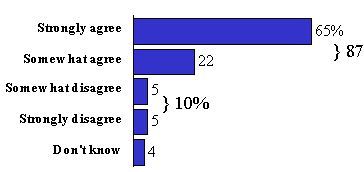
D.C. Public Opinion: A
Review
Equal Constitutional Rights Amendment
An Amendment would not make D.C. citizens equal in the
same way as citizens of states, but it would be a great improvement. The 23rd
Amendment (March 29, 1961) gave D.C. the right to “a number of electors of President
and Vice President equal to the whole number of Senators and Representatives in Congress
to which the District would be entitled if it were a State, but in no event more than the
least populous State.” The 23rd Amendment, which limits D.C. to electors
equal to the smallest state, is a limited Amendment, what Historian Constance Green and
many D.C. citizens call the “half loaf.”
In August 1978, Congress approved the 27th
Amendment by 67-32 (one vote more than the two-thirds majority needed) proposing to give
D.C. voting representation in both houses of Congress. Congress allowed D.C. seven years
to get the Amendment ratified by 38 states (three-fourths of the 50 states). Time ran out
on August 22, 1985, during the Reagan years, when only 16 states had approved. The
campaign had little budget, was opposed by the Statehood Party as well as conservatives
like Judith Best and Orrin Hatch). Best called the Amendment “nominal
statehood.” Some have said that the Amendment was approved by many in Congress
because they knew it would not be approved by the states.
Timothy Cooper, President of Democracy First, advocates
the Equal Constitutional Rights Amendment, but not a more limited Voting Rights Amendment.
He has discussed possible wording with Constitutional lawyers, including Professor
Raven-Hansen. He proposes the following Equal Constitutional Rights Amendment wording: “The
residents of the District of Columbia shall be treated as citizens of a state for all
constitutional intents and purposes.” This amendment would include full
voting representation under Article 2 of the Constitution and the 17th
Amendment, the right to a republican form of government under Article 4, the right to 9th
and 10th Amendment powers and privileges, and the right to equal protection
under the 14th Amendment. An amendment would be tremendously hard to pass and
would require a significant amount of resources, but this opinion research shows that an
Equal Constitutional Rights Amendment would likely be more politically persuasive to the
U.S. public than statehood or retrocession.
Some oppose an amendment because it would be less than
equal to the rights enjoyed by citizens living in a state (“not a whole loaf”),
and it could be reversed.
This author is not aware of opinion studies among D.C.
residents that examine support for an Equal Constitutional Rights Amendment.
Statehood
D.C. citizens have made great efforts to become a state.
In 1969, the D.C. Statehood Committee was formed by Doug Moore, Chuck Stone, Jesse
Anderson, and other African-American activists. Sam Smith first explained statehood in the
D.C. Gazette in June 1970 (“The Case for Statehood”). In the fall of
1970, the Statehood Committee established the D.C. Statehood Party. Julius Hobson, Sr. was
the first statehood candidate. He ran against Walter Fauntroy (of the Southern Christian
Leadership Conference) for the District’s non-voting Delegate seat and won 15,000
(12%) votes.
In 1980, D.C. citizens approved a Citizen Initiative to
call a statehood convention—sixty percent voted in favor of the Statehood Initiative.
Philip Schrag provides a detailed account of the Constitutional Convention (“Behind
the Scenes,” 1985). A majority of all but one Ward supported the Initiative: only 38
percent of Ward 3 approved. In November 1981, forty-five delegates were elected to draft
the Constitution of New Columbia within ninety days on a $150,000 budget (compared to
$1,500,000 for the Hawaii Convention in 1967). The restrictions were placed on the
Convention by the D.C. Council. Participants included three Council members—Hilda
Mason (S), David Clarke (D), and Rev. Jerry Moore (R), and School Board member Barbara
Lett Simmons. The media largely ignored the elections to the convention, and The
Washington Post noted that few of the city’s top elected officials seemed
interested. Voter turnout was very low—six percent.
The Constitution was controversial, especially the
“bill of rights” which included the right to work and to strike. One delegate
termed it the “bill of lefts.” A Congressional appropriations rider made it
illegal for the District to use its own public money in support of the Constitution, and The
Post editorialized in opposition. The Constitution was ratified by vote on Nov. 2,
1982—52.8 percent approved. It was approved by a majority in all Wards except Ward 3
(19.4%) and Ward 2 (48.6%).
In 1993, Congress voted on and rejected D.C. statehood by
63 votes (277 against, 153 for, 4 not voting). A bill can be reintroduced. (It took Hawaii
56 years to achieve statehood.) Polls by The Washington Post show that majorities
of D.C. residents support statehood.
Favorability to D.C. Statehood Among D.C.
Residents
“Do you favor or oppose the District of Columbia becoming a separate
state?”
February 2000
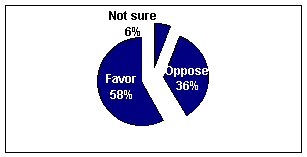
Support for D.C. statehood is increasing after several
years of division in the District.
The Trend: Favorability to D.C. Statehood
Among D.C. Residents
“Do you favor or oppose the District of Columbia becoming a separate state?¨
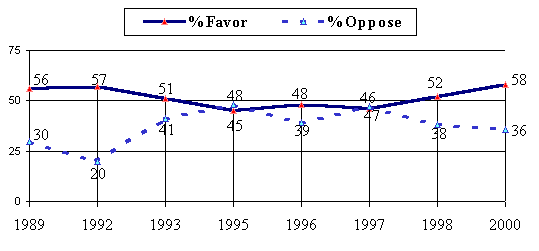
In 1994, the Federal City Council sponsored a poll by The
Wirthlin Group. They found majority support for statehood in the District, but not in the
suburbs in Maryland and Virginia.
Support for D.C. Statehood (1994)
Retrocession—merging D.C. with Maryland
Retrocession was discussed numerous times in the early 19th
century (1803, 1804, 1818, 1834, 1846) by the citizens of the two cities that preceded
Washington City and the District of Columbia: Georgetown (originally in Maryland) and
Alexandria (originally in Virginia). Washington City was never interested in retrocession.
In 1846, foreshadowing the Civil War, the Virginia legislature voted in support of
accepting the Virginia portion of the District back into that state. The federal
government voted approval, with the stipulation that citizens of that part of the District
vote approval in a referendum, which a majority did (763 for 222 against). Citizens of the
country portion were excluded from the vote, were very upset, and protested with no
result.
There has been disagreement about the wisdom of having
retroceded the Virginia portion. Lincoln urged reclaiming it in 1861, but after he was
assassinated the issue was not discussed. In 1875, an attempt was made by an individual in
Alexandria to get a decision by the Supreme Court, but the court held that since U.S. and
Virginia were the parties to the act and both were satisfied, it was not competent for a
private litigant to question the constitutionality. In 1886, the Senate Committee on D.C.
considered whether the Virginia portion could be restored to the District (the McMillan
plan revived interest). But, the Justice Department wrote that the constitutionality had
not been determined. In 1902, a joint resolution was introduced in both houses of Congress
directing the Attorney-General to bring suit to determine the constitutionality. It was
referred to the Senate Judiciary Committee. That committee determined that it was a
political, not a judicial question, a fait accompli.
Today, if the Maryland legislature voted in support of
retrocession, if the Congress and President supported retrocession, and if D.C. citizens
approved of it in a referendum, D.C. could unite with Maryland. The Committee for the
Capital City is promoting this approach as “reunion.” Maryland Governor Parris
N. Glendening wrote in opposition to retrocession: “I am adamantly in opposition to
retrocession… It would be a difficult adjustment for many who have invested heavily to
suddenly find all the rules changed. … For three hundred years, the economic and
political power center of Maryland has been the greater Baltimore area. That has
been slowly changing over the past half century, with the Washington suburbs growing in
population and influence. To suddenly add the District of Columbia to Montgomery and
Prince George’s counties would make them the new center of power in Maryland, without the
opportunity for the rest of the State to adjust to this change. Ironically, the new
power base in Maryland would be created by people who are not Maryland residents.
One can only begin to imagine the economic, social and political chaos this would
create. … No one will be better off as the result of retrocession, either
in the short term or long term.”
A 1994 study of 1,003 D.C. adults and 513 suburban adults
in Montgomery, Prince George, Arlington, Alexandria, and Fairfax counties (October
25-November 5), sponsored by the Federal City Council by The Wirthlin Group, found little
support for retrocession.
% Approve Giving Land Back (Retrocession)
to Maryland
Question: “A few possible solutions for the issues
facing D.C. are being considered today. For each one of these possible solutions that I
read, please tell whether you strongly approve, somewhat approve, somewhat disapprove, or
strongly disapprove…. Giving land back to Maryland.”




